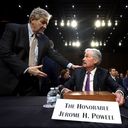Two testy exchanges show Fed's inflation dilemma

Two senators — one Republican, one Democrat; one from Louisiana, the other from Massachusetts — gave Powell a hard time Tuesday on the same theme: that the central bank seems dead-set on putting millions of Americans out of work with monetary tightening.
The big picture: The two unusually testy exchanges were a preview of what is likely to be a key dynamic, both for the central bank and for U.S. political debates heading into the 2024 elections.
Why it matters: The persistence of elevated inflation and a red-hot job market have made hopes of a painless disinflation look more remote in recent weeks. But to the degree American workers bear the brunt of that adjustment, it will intensify bipartisan pressures on the central bank.
- Every month that passes without inflation receding raises the odds that the Fed will keep tightening, and pushes the eventual pain closer to the presidential election cycle.
What they're saying: "When you're slowing the economy, you're trying to put people out of work. That's your job, is it not?" asked Sen. John Kennedy (R-La.) in Tuesday's Senate Banking Committee hearing.
- "Not really," Powell replied. "We're trying to restore price stability."
- Kennedy noted that historical patterns would imply that joblessness would need to jump well above the 4.6% Fed officials now expect in order to bring inflation down to 2%.
- Powell acknowledged "that's what the record would say" but argued this time could be different.
Things were more heated with Sen. Elizabeth Warren (D-Mass.). She emphasized that even a 4.6% jobless rate would imply another 2 million Americans were out of work. "Putting 2 million people out of work is just part of the cost, and they just have to bear it?" she asked, incredulously.
- Powell, displaying a hint of exasperation, retorted, "Will working people be better off if we just walk away from our jobs and inflation remains 5, 6%?"
- Warren added that history has no real examples of unemployment rising only slightly outside of a recession; when unemployment rises, it tends to overshoot anything the Fed now forecasts.
Between the lines: The Fed has held out hope that unique circumstances — including post-pandemic supply chain problems and one-time fiscal stimulus — mean that inflation might dissipate with minimal pain.
- In theory, the labor market could come into balance, for example, through fewer job openings and slower hiring rather than outright job losses.
- The problem is that, so far in 2023, it just isn't happening. And the longer it takes, the more likely the Fed is to see an old-fashioned recession, with all the economic pain that entails, as necessary
The bottom line: The heat is already being turned up at a time when the unemployment rate is at a five-decade low. Just wait until the job market actually hits the rocks.